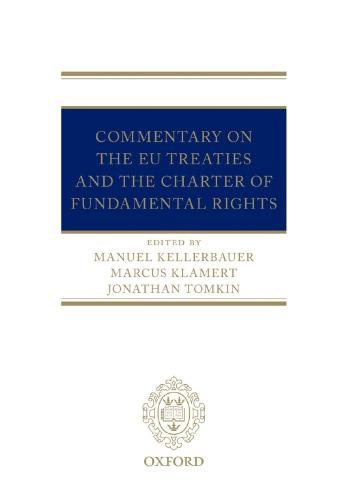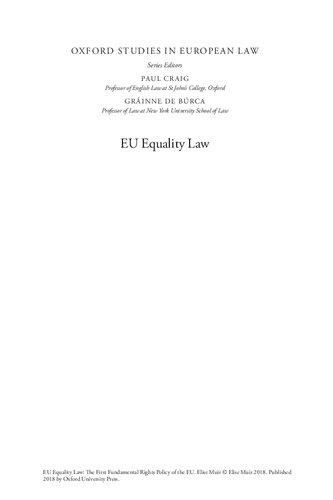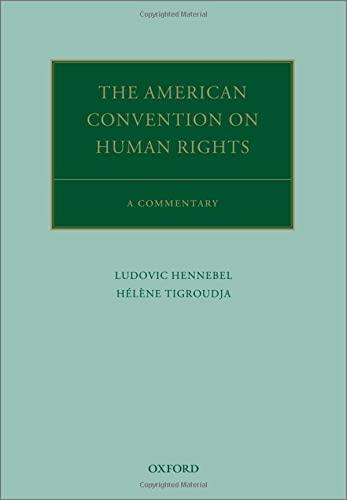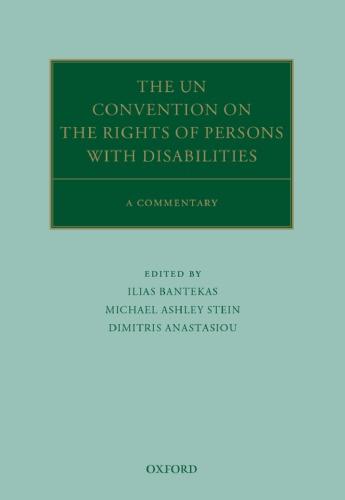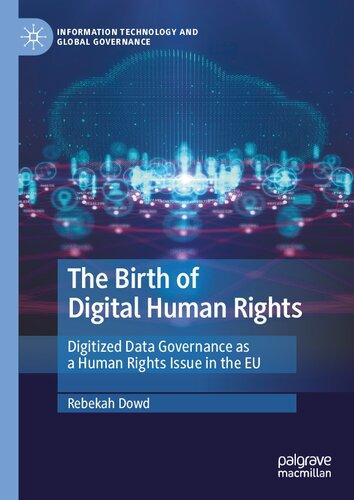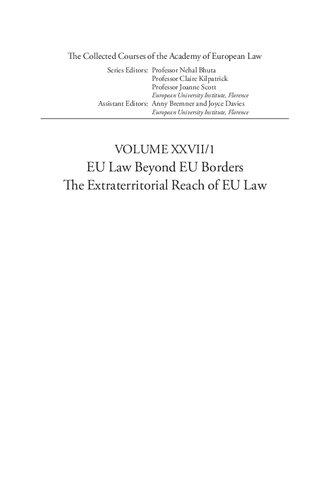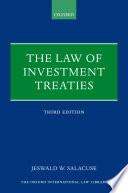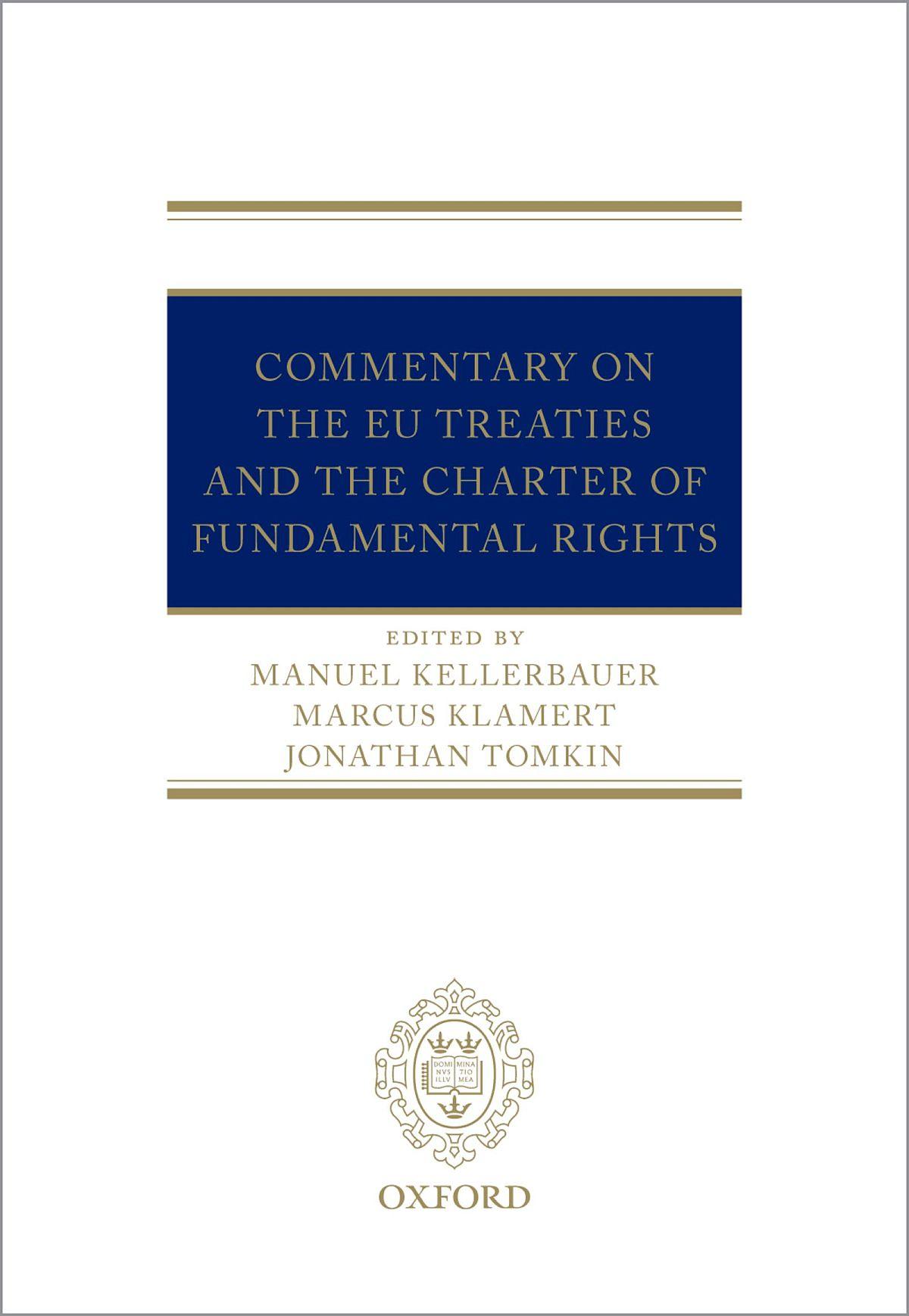The EU Treaties and the Charter of Fundamental Rights
A COMMENTARY
EDITED BY MANUEL KELLERBAUER
MARCUS KLAMERT and JONATHAN TOMKIN
Great Clarendon Street, Oxford, OX2 6DP, United Kingdom
Oxford University Press is a department of the University of Oxford. It furthers the University’s objective of excellence in research, scholarship, and education by publishing worldwide. Oxford is a registered trade mark of Oxford University Press in the UK and in certain other countries
© The several contributors 2019
The moral rights of the authors have been asserted First Edition published in 2019
Impression: 1
All rights reserved. No part of this publication may be reproduced, stored in a retrieval system, or transmitted, in any form or by any means, without the prior permission in writing of Oxford University Press, or as expressly permitted by law, by licence or under terms agreed with the appropriate reprographics rights organization. Enquiries concerning reproduction outside the scope of the above should be sent to the Rights Department, Oxford University Press, at the address above
You must not circulate this work in any other form and you must impose this same condition on any acquirer
Crown copyright material is reproduced under Class Licence Number C01P0000148 with the permission of OPSI and the Queen’s Printer for Scotland
Published in the United States of America by Oxford University Press 198 Madison Avenue, New York, NY 10016, United States of America
British Library Cataloguing in Publication Data
Data available
Library of Congress Control Number: 2018951257
ISBN 978–0–19–879456–1
Printed in Italy by L.E.G.O. S.p.A.
Links to third party websites are provided by Oxford in good faith and for information only. Oxford disclaims any responsibility for the materials contained in any third party website referenced in this work.
Foreword
The establishment of a European Union, which according to Article 1 TEU is intended to create ‘an ever closer Union among the peoples of Europe’, is being threatened from within. And the most serious threat is to the rule of law in Europe and the effectiveness and uniformity of the application of EU law in all the Member States.
A first attack on the rule of law has been directed at the values that constitute the very foundations of the Union as laid down in Article 2 TEU.
The immediate victim of the second attack is each citizen of the European Union who risks being prevented from exercising the rights that he or she derives from EU law on the same terms.
The foregoing observations make it clear why this book is of paramount importance at this time. Explaining to the citizens of the European Union (and not only lawyers) how the goals, values, principles, competences, institutional machinery, and procedures of the European Union are shaped is nowadays an urgent task.
At the turn of the 20th century, Sir William Osler noted that ‘The greater the ignorance the greater the dogmatism’. Too many important decisions having immense impacts on the lives of millions of people in Europe and elsewhere have arisen out of pure ignorance and ensuing dogmatism. This book helps to fill an important gap in the general knowledge of the constitutional and institutional framework of the European Union.
This book will be of great value not only to scholars and students, judges and practitioners, civil servants and company lawyers, legislators, policy makers and business people. In general, all citizens wishing to find out more about the Union, its objectives and mechanisms, the decision-making practice of the European Commission and the most relevant case law of the Court of Justice of the European Union, may find an answer in the pages that follow.
Written by distinguished academics and members of the Commission’s Legal Service, some with past experience in private practice in member and non-member States, the book is exemplary in its structure, format and content.
First of all, it gives a complete picture of all the main issues concerning the constitutional provisions of the Treaty on European Union (TEU), the Treaty on the Functioning of the European Union (TFEU) and the Charter of Fundamental Rights of the European Union (the Charter). They are presented in a comprehensive manner, which assists the reader on a wide range of matters falling within the scope of what is currently known as the ‘EU legal order’.
That legal framework is no longer a mere tool for developing trade and strengthening economic integration between Member States. It encompasses nowadays a wide array of matters typically pertaining to a true constitutional legal order: a common currency, Union citizenship and a common area of freedom, security and justice, a division of competences and powers and a number of principles governing that division, a formal catalogue of fundamental rights, a sophisticated institutional machinery, a set of policies to be pursued by the political authorities, an international legal personality, and an embryo of foreign and security policy in the international arena.
This book contributes to a better understanding of the meaning and scope of the constitutional provisions that govern the Union and how they are applied.
Second, the commentaries are written in a clear and concise manner accessible to any normally informed person. Moreover, the reader may easily find his or her way to further, more specialized, readings that complete the information already provided in the commentaries.
Indeed—and this is another quality of the book—each Commentary is preceded in general by useful information relating to a ‘Selected bibliography’ and ‘Essential case law’, as well as, where appropriate, a table of contents and a listing of the main legal acts or instruments of ‘soft law’ (Commission notices and communications, guidelines, action plans, etc.). There is also an introduction, overview and selected bibliography for each title or chapter of the Treaties and the Charter. The commentaries further rightly set out widely recognized academic legal writings and appropriately build upon them in order to reach their conclusions.
In addition, the texts contain abundant references to international treaties and other instruments of international law, including in particular the Convention for the Protection of Human Rights and Fundamental Freedoms (the European Convention on Human Rights). The case law of the European Court of Human Rights has received considerable analysis, mainly as concerns the application of the Charter of Fundamental Rights. This is not surprising since, as stated in Article 52(3) of the Charter, ‘[in] so far as this Charter contains rights which correspond to rights guaranteed by the [European Convention], the meaning and scope of those rights shall be the same as those laid down by the said Convention’, without prejudice to the possibility for EU law to provide more extensive protection.
However, it is of course the case law of the Courts of the European Union (the Court of Justice and the General Court) which receives the most extensive coverage. In that regard, the book offers a comprehensive and in-depth analysis of such case law (including, where relevant, of the case law of the EFTA Court), as well as of the opinions of Advocates General, thus providing elegant—and sometimes controversial—legal commentary.
No doubt that the great experience and vast knowledge of the combined authors constitutes the mainstay of a colossal work. The fact that I may not share all the views expressed by the commentators among the more than 2000 pages of the book does not stop me from considering it a serious piece of work of the highest quality. I sincerely welcome the debate that may arise, in the legal literature, from such vast and rich amounts of analysis, ideas and arguments.
I was deeply pleased and honoured to receive the invitation from the three co-editors— Manuel Kellerbauer, Marcus Klamert and Jonathan Tomkin—asking me to write the foreword to the book they undertook to write and coordinate.
I would like to sincerely congratulate them and all their co-authors for this undertaking that represents a major contribution to the reflection on the current state of the EU legal order. Most of them are very well-known faces to the members of the Court of Justice, who appreciate their competence, professionalism and integrity.
I am sure that this book will become a regular companion to judges, lawyers and scholars at EU and national level. I strongly recommend it to everybody who feels the need for assistance in understanding the increasing complexity of EU law or to all those who are simply interested in being better informed on the basic laws of the Union.
José Luís da Cruz Vilaça Judge, President of Chamber (2012–2018) European Court of Justice
Preface
The European Union is essentially a legal construct. For over sixty years, its shape and scope have been defined and developed through the adoption of successive EEC, EC and EU Treaties and their interpretation by the Court of Justice of the European Union.
The EU Treaties and the accompanying Charter of Fundamental Rights are not merely a set of operational rules; they represent the embodiment of the shared laws, principles, and values of successive generations of constituent Member States. In the absence of any single language, ethnicity or culture, those shared laws, principles and values have been fundamental in defining the EU’s identity. It is thus unsurprising that the EU Treaties have been referred to by the Union Courts as the ‘constitutional charter’ of (what is now) the European Union.
An understanding of this constitutional charter allows for an understanding of what the Union is and represents, namely, a thriving supranational organisation based on the common values of its members that has demonstrated resilience in the face of uprecedented challenges. In times suggestive of a drift towards unilateralism, the case for promoting a thorough and correct understanding of this unique model of international cooperation is even more compelling.
It was in the light of such considerations that, during a phone call between Vienna and Brussels in March 2015, the decision was taken to write this book: a comprehensive article-by-article commentary that presents within a single volume the constitutional framework of the EU legal order and that ensures a clear and structured analysis of each provision of primary law as interpreted by the Union Courts. We are very grateful to OUP for having quickly endorsed what has been, to say the least, a sizeable endeavour and for providing encouragement until its completion.
Over three years have passed and many more phone calls between Oxford, Vienna and Brussels have followed. As editors, we have managed to complement each other’s fields of expertise and skills effectively, making this project a truly enjoyable though timeconsuming endeavour. We are delighted and proud to have been able to enlist some of the most renowned and knowledgeable experts in their respective areas of EU law as co-authors.
The Commentary considers academic analysis and comment, but is also intended to facilitate the practice of EU law. To this end, special features have been incorporated to enable ready access and identification of key issues: each title, chapter, and section is preceded by an ‘Introduction’ setting out issues common to the articles considered. In addition, ‘Overviews’ give concise summaries of the content of the provisions. At the beginning of each article, a ‘Selected bibliography’ points to academic references considered especially relevant and useful. Under ‘Essential case law’, the Commentary gives a succinct summary of the most relevant findings of the Union Courts and the European Court of Human Rights. Finally, summaries of ‘Main legal instruments’ concisely describe key secondary law of relevance to the provisions analysed.
We are very grateful to a number of people who have assisted in various ways in realizing this project: Dominik Schnichels for bringing two of the editors together, Christine Pesendorfer for her gracious support from the very beginning, as well as Lukasz
Preface
Baumgart, Caragh Cunniffe, Chris Docksey, Barbara Ernst, Aurélie-Anne Gilly, Anna Gnap, Lóránt Havas, Franz Koppensteiner, Emmanuel Manhaeve, Maria-Isabel Martinez del Peral, Rudolphe Munoz, Piedade Costa de Oliveira, Claire Smith, John Stanley, Peter Thalmann, Daniel Thym, Rudi Troosters and Jacquelyn Veraldi, for giving so generously of their limited time and abundant expertise to review numerous sections of the Commentary or to provide valuable input. However, any views expressed remain personal to the authors.
Special thanks are also due to Alex Flach, Natasha Flemming, Imogen Hill, Natalie Patey, Alec Swann and Emma Taylor at OUP for all their enthusiastic support, persistence and encouragement.
Finally, the editors would like to thank their families and children for their support and forbearance during the many hours, evenings and weekends, required to bring this project to fruition. They would like to dedicate this book to their children, who form part of the next generation of EU citizens: Anna Serena, Elias, Filippa, Laya and Luis. While writing was completed on 30 May 2018, it has been possible to take account of major legal developments as of January 2019.
Manuel Kellerbauer, Marcus Klamert and Jonathan Tomkin Brussels and Vienna January 2019
Abbreviations
Article
Articles
Chapter
Introduction
Articles
Chapter
Introduction
Introduction
Articles
Articles
Articles
Articles
Chapter
Introduction
Article
Chapter
Introduction
Articles
Chapter
Introduction
Articles
TITLE
Introduction
Articles
TITLE VII COMMON RULES ON COMPETITION, TAXATION AND APPROXIMATION OF LAWS 992
Chapter 1 Rules on competition 992
Introduction Manuel Kellerbauer 992
Section 1 Rules applying to undertakings 994
Introduction Manuel Kellerbauer 994
Article 101 Gero Meeßen 998
Article 102 Manuel Kellerbauer 1037
Article 103 Manuel Kellerbauer and Gero Meeßen 1059
Articles 104–105 Manuel Kellerbauer 1086
Article 106 Manuel Kellerbauer and Tim Maxian Rusche 1088
Section 2 Aids granted by States 1111
Articles 107–109 Tim Maxian Rusche 1111
Chapter 2 Tax provisions 1219
Introduction Manuel Kellerbauer 1219
Articles 110–113 Manuel Kellerbauer 1221
Chapter 3 Approximation of laws 1231
Introduction Manuel Kellerbauer 1231
Articles 114–118 Manuel Kellerbauer 1235
Articles 127–133 Leo Flynn
Chapter 3 Institutional provisions 1315
Articles 134–135 Leo Flynn 1316
Chapter 4 Provisions specific to Member States whose currency is the euro 1319
Articles 136–138 Leo Flynn 1320
Chapter 5 Transitional provisions 1326
Articles 139–144 Leo Flynn 1327
TITLE IX EMPLOYMENT 1338
Introduction Sacha Garben 1338
Articles 145–150 Sacha Garben 1341
TITLE X SOCIAL POLICY 1352
Introduction Sacha Garben 1352
Articles 151–156 Sacha Garben 1354
Article 157 Denis Martin 1401
Articles 158–161 Sacha Garben 1415
TITLE
Introduction
Articles
TITLE
Introduction
Articles 165–166 Sacha Garben
TITLE
Article
TITLE
Article
TITLE
Article
TITLE
Introduction
Article
Introduction
Articles
TITLE
Introduction
Articles
TITLE
Introduction
Articles
Article
Article
TITLE
Article
TITLE
Article
Introduction
Articles 198–204 Dimitry Kochenov 1565
PART FIVE EXTERNAL ACTION BY THE UNION 1580
TITLE I THE UNION’S EXTERNAL ACTION 1581
Article 205 Friedrich Erlbacher and Tim Maxian Rusche 1582
TITLE II COMMON COMMERCIAL POLICY 1585
Articles 206–207 Friedrich Erlbacher and Tim Maxian Rusche 1585
TITLE III COOPERATION WITH THIRD COUNTRIES AND HUMANITARIAN AID 1606
Introduction Friedrich Erlbacher and Marcus Klamert 1606
Chapter 1 Development cooperation 1610
Articles 208–211 Marcus Klamert 1610
Chapter 2 Economic, financial and technical cooperation with third countries 1619
Articles 212–213 Friedrich Erlbacher 1619
Chapter 3 Humanitarian aid 1626
Article 214 Friedrich Erlbacher 1626
TITLE IV RESTRICTIVE MEASURES 1631
Article 215 Friedrich Erlbacher 1631
TITLE V INTERNATIONAL AGREEMENTS 1642
Introduction Friedrich Erlbacher 1642
Articles 216–219 Friedrich Erlbacher 1643
TITLE VI THE UNION’S RELATIONS WITH INTERNATIONAL ORGANISATIONS AND THIRD COUNTRIES AND UNION DELEGATIONS 1676
Articles 220–221 Friedrich Erlbacher 1676
TITLE VII SOLIDARITY CLAUSE 1690
Article 222 Friedrich Erlbacher 1690
PART SIX INSTITUTIONAL AND FINANCIAL PROVISIONS 1697
TITLE I INSTITUTIONAL PROVISIONS 1697
Chapter 1 The institutions 1697
Introduction Paul-John Loewenthal 1697
Section 1 The European Parliament 1698
Articles 223–234 Paul-John Loewenthal 1700
Section 2 The European Council 1724
Articles 235–236 Paul-John Loewenthal 1725
Section 3 The Council 1728
Articles 237–243 Paul-John Loewenthal 1729
Section 4 The Commission 1739
Articles 244–250 Paul-John Loewenthal 1740
Section 5 The Court of Justice of the European Union 1748
Introduction Bernhard Schima 1748
Articles 251–281 Bernhard Schima 1751
Section 6 The European Central Bank 1879
Articles 282–284 Leo Flynn 1880
Section 7 The Court of Auditors 1886
Articles 285–287 Leo Flynn 1887
Chapter 2 Legal acts of the Union, adoption procedures and other provisions 1893
Introduction Paul-John Loewenthal 1893
Section 1 The legal acts of the Union 1895
Article 288 Marcus Klamert and Paul-John Loewenthal 1895
Articles 289–292 Paul-John Loewenthal 1911
Section 2 Procedures for the adoption of acts and other provisions 1934
Articles 293–299 Paul-John Loewenthal 1934
Chapter 3 The Union’s advisory bodies 1953
Article 300 Marcus Klamert 1954
Section 1 The Economic and Social Committee 1959
Articles 301–304 Marcus Klamert 1959
Section 2 The Committee of the Regions 1963
Articles 305–307 Marcus Klamert 1963
Chapter 4 The European Investment Bank 1967
Articles 308–309 Leo Flynn 1968
TITLE II FINANCIAL PROVISIONS 1972
Introduction Bernd-Roland Killmann 1972
Article 310 Bernd-Roland Killmann 1975
Chapter 1 The Union’s own resources 1977
Article 311 Bernd-Roland Killmann 1977
Chapter 2 The multiannual financial framework 1980
Article 312 Bernd-Roland Killmann 1980
Chapter 3 The Union’s annual budget 1982
Articles 313–316 Bernd-Roland Killmann 1982
Chapter 4 Implementation of the budget and discharge 1988
Articles 317–319 Bernd-Roland Killmann 1988
Chapter 5 Common provisions 1992
Articles 320–324 Bernd-Roland Killmann 1992
Chapter 6 Combatting fraud 1998
Article 325 Bernd-Roland Killmann 1998
TITLE III ENHANCED COOPERATION 2003
Articles 326–334 Manuel Kellerbauer 2004
PART SEVEN GENERAL AND FINAL PROVISIONS 2016
Articles 335–336 Marcus Klamert 2018
Articles 337–342 Manuel Kellerbauer 2022
Articles 343–345 Marcus Klamert 2044
Articles 346–348 Manuel Kellerbauer 2050
Article
Article
CHARTER
Notes on Contributors
Wolfgang Bogensberger is Deputy Head of the Representation of the European Commission in Austria. Previously, he was a judge at the Juvenile Justice Court in Vienna, a Director General at the Austrian Ministry of Justice, a principal administrator in the secretariat of the Committee on Civil Liberties, Justice and Home Affairs in the European Parliament, and a Legal Advisor at the Legal Service of the European Commission. He has represented the Commission in numerous cases before the CJEU, predominantly in criminal matters. He holds doctorates in law and in philosophy and a postgraduate diploma in European law. He has published in the field of domestic and European criminal law and lectures on fundamental rights at the Sigmund Freud University in Vienna.
André Bouquet is a Legal Adviser at the Legal Service of the European Commission (CFSP and External Relations Team). Previously he was Member and thereafter acting head of the Agriculture and Fisheries team, and before that he was Member of the Competition team. Prior to joining the Legal Service he worked at the Euratom Supply Agency, dealing inter alia with legal matters. He appears regularly before the European Court of Justice, predominantly in matters related to competition, fisheries, agriculture and interinstitutional dispute affairs as well as in international litigation cases (ITLOS and UNCLOS arbitration). Before working at the European Commission he practiced law at the Brussels and Antwerp Bar. He has published and lectured in the field of nuclear law (Euratom Treaty), competition and fisheries.
Friedrich Erlbacher is a Legal Adviser at the Legal Service of the European Commission (Institutional Team). He is a former Legal Secretary (Référendaire) at the General Court of the European Union. He has published and lectured extensively in various fields including external relations, judicial protection, and state aid.
Leo Flynn is a Legal Adviser at the Legal Service of the European Commission (Eurozone Team). Before joining the Legal Service in 2002, he worked as Legal Secretary (Référendaire) at the Court of Justice and lectured at King’s College London, where he now is a visiting Professor at its Centre for European Law. He has written widely on Union law, especially on State aid, social policy, and Union law in national courts.
Sacha Garben is Professor of EU law at the College of Europe and on leave from the European Commission. As well as a prize-winning PhD from the European University Institute (Florence), she holds an LLM from the College of Europe and a Master’s degree from the University of Maastricht. She has held a 2-year postdoctoral fellowship with the London School of Economics as well as a visiting fellowship from Harvard Law School. She has published extensively on a range of constitutional and substantive EU law issues, including the division of competences between the EU and the Member States, Social Europe and European higher education law and policy.
Manuel Kellerbauer is a Member of the Legal Service of the European Commission (CFSP and External Affairs Team). He appears regularly before the European Court of Justice, predominantly in matters related to competition, internal market and social
affairs. He previously worked at the Commission’s Directorate-General for Competition. He passed the German bar exam and holds master’s degrees from the Universities of Aix-en-Provence and Tübingen, as well as a PhD from the University of Tübingen. He is a guest lecturer at the Universities of Saarbrücken and Lyon, has published widely on EU law, and is a member of the advisory board of the European Journal of Business Law (EuZW).
Bernd-Roland Killmann is a Member of the Legal Service of the European Commission (Social, Consumer Affairs and Equality Team). He holds a doctorate in law from the University of Graz, a Master of Business Law from the University of Sankt Gallen, and a diploma from the Paul H. Nitze School of Advanced International Studies at the Johns Hopkins University in Bologna. Before joining the Commission, he worked as a research assistant at the law faculty of the University of Graz and in law firms in Austria and Italy. He has published and lectured in the field of European law.
Marcus Klamert is a Legal Adviser at the Federal Chancellery of Austria and holds a postdoctoral qualification to lecture in European and public international law (Habilitation) awarded by the Vienna University of Economics and Business. He has held (visiting) fellowships with the Austrian Academy of Sciences, the Institute of European and Comparative Law, University of Oxford, and the European University Institute, Florence. He has represented Austria before the CJEU, has practised law in a leading international law firm in Vienna, and has worked for the European Commission in Brussels. His publications include The Principle of Loyalty in EU Law (OUP 2014) and Services Liberalization in the EU and WTO – Concepts, Standards and Regulatory Approaches (CUP 2014).
Dimitry Kochenov is Professor of EU Constitutional Law in the Faculty of Law, University of Groningen. He was a visiting professor at Princeton University, the College of Europe and Università degli Studi di Torino, and held fellowships, inter alia, at Princeton’s Woodrow Wilson School, Institute of Global Studies in Basel and NYU Law School. He recently edited EU Citizenship and Federalism (CUP 2017). His second monograph Citizenship is forthcoming with MIT Press in 2019.
Alexandre-Xavier-Pierre Lewis is a Legal Adviser at the Legal Service of the European Commission (Agricultural Team). Previously he practiced law at the Paris Bar and the English Bar, was Director of Legal and Executive Affairs, EFTA Surveillance Authority, and Legal Secretary (Référendaire) to AG Francis Jacobs in the Court of Justice. He holds an LLB, a Maîtrise en Droit and a DEA in civil law from King’s College London and the University of Paris I (Panthéon-Sorbonne), and is a Fellow of Harvard University. He has represented the Commission in numerous cases before the Court of Justice, the General Court, the EFTA Court and the US Federal District Court.
Tobias Lock is Professor of Law at the National University of Ireland, Maynooth. He previously worked at the Universities of Edinburgh, Surrey, Erlangen, and at University College London. During 2018 he served on the Scottish First Minister’s Advisory Group on Human Rights Leadership. His main research interests are in EU constitutional law, EU fundamental rights law, and multi-level relations between the EU and other legal orders. His publications include The European Court of Justice and International Courts (OUP 2015).
Paul-John Loewenthal is a Member of the Legal Service of the European Commission (State Aid Team). He has represented the Commission as an agent in numerous cases before the CJEU, predominantly in matters related to State aid and taxation. He previously worked as a Legal Secretary (Référendaire) at the Court of Justice and the General Court of the European Union, as an attorney in a leading global law firm in Brussels and Washington D.C., and as a university lecturer at Oxford and Harvard Universities. He holds degrees from Harvard Law School (LL.M), Oxford University (M.Phil, M.Jur), the Institut d’études politiques de Paris (Sciences Po), and Leiden University.
Denis Martin is a Legal Adviser at the Legal Service of the European Commission (Social, Consumer Affairs and Equality Team). Prior to joining the Legal Service in 2000, he worked in the Directorate-General responsible in particular for free movement of workers, sex equality and the prohibition of discrimination. He is an invited Professor at UC Louvain, and has published extensively on the free movement of persons and on the prohibition of discrimination in Union law.
Tim Maxian Rusche is a Member of the Legal Service of the European Commission (Eurozone Team). Previously, he worked in the State aid team of the Legal Service and in DG Energy and Transport. He has represented the Commission in numerous court cases before the CJEU, in national courts, and in investment arbitration procedures. He holds a joined Maîtrise en droit and Magister Legum from University of Paris I (PanthéonSorbonne) and University of Cologne, a Masters in Public Administration from the Harvard Kennedy School, and a joined Franco-German doctorate in law from the University of Paris I (Panthéon-Sorbonne) and the University of Cologne. He is the author of EU Renewable Electricity Law and Policy (CUP 2015) and has published extensively, in particular on State aid law, trade defence law and regulatory law (transport, energy, and environment).
Gero Meeßen is a Member of the Legal Service of the European Commission (Competition Team). He has represented the Commission as an agent in numerous cases before the CJEU, predominantly in matters related to competition law. He previously worked as a case handler, case manager (with a focus on energy markets) and Head of Unit at the Bundeskartellamt’s (German Federal Cartel Office) General Policy Division. He passed the German bar exam and holds an M.Jur. (University of Oxford) and a Dr.iur. (University of Münster). He lectures EU Competition Law at the Europa-Institut of the University of Saarbrücken.
Maria Moustakali is a case handler in the office of the European Ombudsman. She has previously worked in the Legal Service of the EFTA Surveillance Authority (ESA), and has represented ESA as an agent in numerous cases before the EFTA Court and the CJEU. She has graduated from the law school of the University of Athens and also holds Master’s degrees from the College of Europe and Columbia Law School.
Thomas Ramopoulos is a Member of the Legal Service of the European Commission (CFSP and External Relations Team). He studied law (Hons) at Aristotle University of Thessaloniki and holds a Master of Philosophy in International Relations from the University of Cambridge. Since May 2011 he has been a fellow of the Centre for Global Governance Studies at KU Leuven. He has published extensively on EU external relations law and is a co-author of The Law of EU External Relations: Cases, Materials and Commentary on the EU as an International Legal Actor (2nd ed, OUP 2015).
Bernhard Schima is a Legal Adviser and Assistant to the Director-General of the Legal Service of the European Commission. He is a former Legal Secretary (Référendaire) at the Court of Justice of the European Union and former EU Fellow at Yale University, holds a postdoctoral qualification to lecture in European law (Habilitation), and is an honorary professor of European Law at the Vienna University of Economics and Business. He has published and lectured extensively in the field of EU law, with a particular emphasis on court procedure.
Audronė Steiblytė is a Member of the Legal Service of the European Commission (Establishment, services, business law, movement of capital, transport, intellectual property and information society Team). Previously, she was a lecturer at Mykolas Romeris University and as government official was directly involved in the accession negotiations of Lithuania. She has represented the Commission in numerous cases before the CJEU.
Jonathan Tomkin is a Member of the Legal Service of the European Commission (Justice, Liberty and Security team). Since 2016, he is an affiliated researcher at the Institute of European Law, KU Leuven. He is a barrister (admitted to the Bars of Ireland, England and Wales – Inner Temple), a former Director of the Irish Centre for European Law at Trinity College, Dublin, and has previously worked as a Legal Secretary (Référendaire) at the European Court of Justice. He appears regularly before the CJEU and has published and lectured extensively, particularly in the field of Union citizenship, asylum and free movement law. He is a co-author and co-editor of EU Immigration and Asylum Law (Brill 2012), and The EU Citizenship Directive (OUP 2014), respectively.
Michael Wilderspin is a Legal Adviser at the Legal Service of the European Commission (Justice, Liberty and Security Team). He has represented the Commission in numerous cases before the CJEU, the EFTA Court and international arbitral tribunals. He previously worked as a Legal Secretary (référendaire) at the Court of Justice. He has lectured at the Universities of Durham, Saarbrücken and Paris II (Panthéon-Assas), and currently lectures at UCL Louvain-la-Neuve and Université Lyon III, where he is a Visiting Professor. He has published extensively, mainly in the field of private international law.
Abbreviations
AA Assocation Agreement
AAAA Addis Ababa Action Agenda
ACP African, Caribbean and Pacific
ACTA Anti-conterfeiting Trade Agreement
ADA Anti-dumping Agreement
ADN Agreement concerning the International Carriage of Dangerous Goods by Inland Waterways
ADR Agreement concerning the International Carriage of Dangerous Goods by Road
AETR Agreement concerning the Work of Crews of Vehicles Engaged in International Road Transport
AFSJ Area of Freedom, Security and Justice
AG Advocate General
AMS Aggregate Measurement of Support
APO Associations of Producer Organizations
ARO Asset Recovery Office
ASCM Agreement on Subsidies and Counter-Veiling Measures
BC Int’l & Boston College International Comparative Law Review
Comp L Rev
BIOT British Indian Ocean Territory
BIS Bank for International Settlements
BIT Bilateral Investment Treaty
BOI Binding Origin Information
BVerfG German Federal Constitutional Court
CAP Common Agriculture Policy
CATs Coordinating Committee in the area of police and judicial cooperation in criminal matters
CCP Common Commercial Policy
CDE Cahiers de Droit Europeen
CEAS Common European Asylum System
CEPOL European Union Agency for Law Enforcement Training
CETA Comprehensive Economic and Trade Agreement
CIVCOM Committee for Civilian Aspects of Crisis Management
CFP Common Fisheries Policy
CFR Council on Foreign Relations
CFSP Common Foreign and Security Policy
CIR Common Implementing Regulation
CISA Convention Implementing the Schengen Agreement
CJEU Court of Justice of the European Union
CML Rev Common Market Law Review
CMLR Common Market Law Reports
CMO Common Market Organization
Abbreviations
CN Combined Nomenclature
ConstT Treaty establishing a Constitution for Europe
CoE Council of Europa
COHAFA Council working party on Humanitarian Aid and Food Aid
Columbia J Columbia Journal of European Law of Europ L
CoR Committee of the Regions
COREPER Committee of Permanent Representatives
COSI Standing Committee on Operational Cooperation on Internal Security
COTER Commission on Territorial Cohesion Policy
COTIF Convention concerning International Carriage by Rail
CRC Convention on the Rights of the Child
COSAC Conference of Parliamentary Committees for Union Affairs
CSDP Common Security and Defence Policy
CSFP Commonwealth Scholarship and Fellowship Plan
CTP Common Transport Policy
CUP Cambridge University Press
CYELS Cambridge Yearbook of European Legal Studies
DAA Draft Accession Agreement
DAC Development Assistance Committees
DC Development Cooperation
DCFTA Deep and Comprehensive Free Trade Areas
DCI Development Cooperation Instrument
DG Directorate General
DPA Data Protection Authority
DTTs Double Taxation Treaties
EAEC European Atomic Energy Community
EAFRD European Agricultural Fund for Rural Development
EAGF European Agricultural Guarantee Fund
EAGGF European Agricultural Guidance and Guarantee Fund
EASO European Asylum Support Office
EAW European Arrest Warrant
EBRD European Bank for Reconstruction and Development
EC European Community
ECAC European Civil Aviation Convention
ECB Euroepan Central Bank
ECHO European Civil Protection and Humanitarian Aid Operations
ECHR European Convention on Human Rights
ECI European Citizens’ Initiative
ECJ European Court of Justice
ECDC European Centre for Disease Prevention and Control
ECN European Competition Network
ECOFIN Economic and Finance Council
ECRIS European Criminal Records Information System
ECRIS-TCN
European Criminal Records Information System for Third-country
Nationals and Stateless Persons
Abbreviations
ECSC European Coal and Steel Community
ECtHR European Court of Human Rights
ECT Energy Charter Treaty
ECTC European Counter Terrorism Centre
ECTS European Credit Transfer System
ECVET European Credit system for Vocational Education and Training
EDA European Defence Agency
EDF Environmental Defense Fund and European Development Fund
EDPB European Data Protection Board
EDC European Defence Community
EEA European Economic Area
EEAS European External Action Service
EEC European Economic Community
EEO European Enforcement Order
EES European Employment Strategy
EES Entry/Exit System
EESC European Economic and Social Council
EEZ Exclusive Economic Zone
EFC Economic and Financial Committee
EFAR European Foreign Affairs Review
EFSA European Food Safety Authority
EFSF European Finanical Stability Facility
EGAF European Globalisation Adjustment Fund
EGTC European Grouping of Territorial Cooperation
EIB European Investment Bank
EIDHR European Instrument for Democracy and Human Rights
EIF European Investment Fund
EIoP European Integration Online Papers
EIPR European Intellectual Property Review
EJIR European Journal of International Relations
EJLS European Journal of Legal Studies
EJN European Judicial Network
EJML European Journal of Migration and Law
EJTN European Judicial Training Network
EMA European Medicines Agency
ELJ European Law Journal
EL Rev European Law Review
EMCO Employment Committee
EMCDDA European Monitoring Centre for Drugs and Drug Addiction
EMU Economic and Monetary Union
ENI European Neighbourhood Instrument
ENP European Neighbourhood Policy
ENS Entry Summary
EORI Economic Operator Registration and Identification
EP European Parliament
EPA European Partnership Agreement
EPC European Political Cooperation
EPO
Abbreviations
European Protection Order
EPPO European Public Prosecutor’s Office
EPSCO Employment and Social Affairs Council
ERA Eureopan Research Area
ERAC
ERCC
ERM
European Research Area and Innovation Committee
Emergency Response Coordination Centre
Exchange Rate Mechanism
ESA European Space Agency
ESC European Social Charter
ESCB
ESDC
ESDP
ESIF
ESM
European Systems of Central Banks
European Security and Defence College
European Security and Defence Policy
European Structural and Investment Funds
European Stability Mechanism
ESS European Statistical System
EStAL
European State Aid Law Quarterly
ESRB European Systemic Risk Board
ETIAS EU Travel Information and Authorization System
ETS Emmissions Trading Scheme
EU European Union
EUAM Advisory Mission for Civilian Security Sector Reform Ukraine
EUBAM European Union Border Assistance Mission Point
EUCAP European Union Capacity Building Mission
EUCARIS European Car and Driving Licence Information System
EUCPN European Crime Prevention Network
eucrim Journal for the Protection of the Financial Interests of the European Union
Eu Const L R
European Constitutional Law Review
EUFOR European Union Force
EU IRU
European Union Internet Referral Unit
EUISS European Union Institute for Security Studies
EULEX European Union Rule of Law Mission in Kosovo
KOSOVO
EUMC Military Committee of the European Union
EUMM European Union Monitoring Mission
EUMR EU Merger Regulation
EUMS Military Staff of the European Union
EUPOL European Union Police Mission for the Palestinian Territories
COPPS
EuR Europarecht
EUROMED Euro-Mediterranean partnership
Eur Rev European Review of Private Law
Private L
EUSF
European Union Solidarity Fund
EUTM European Union Training Mission
EUVR Zeitschrift für Europäisches Unternehmens- und Verbraucherrecht
Abbreviations
EuZW Europäische Zeitschrift für Wirtschaftsrecht (European Journal of Business Law)
EWG
Eurogroup Working Group
EWS Europäisches Wirtschafts- und Steuerrecht
EYCS Education, Youth, Culture and Sport Council
FAC Foreign Affairs Council
FAR Regulation 1006/2008 on fishing authorizations
FAFA Financial and Adminstrative Framework Agreement
FAO Food and Agriculture Organization
FEMIP Facility for Euro-Mediterranean Investment and Partnership
FIUs Financial Intelligence Units
Ford Int La J Fordham International Law Journal
FTA Free Trade Agreement
GAC General Affairs Council
GAECs Good Agricultural and Environmental Conditions
GAERC General Affairs and External Relations Council
GATS General Agreement on Trade in Services
GATT General Agreement on Tariffs and Trade
GC General Court
GDPR General Data Protection Regulation
GRECO Group of States Against Corruption
GSP Generalized Scheme of Preferences
HA Humanitarian Aid
Harvard ILJ Harvard International Law Journal
HR High Representative
IA International Agreement
IACS Integrated Administration and Control System
ICAO International Civil Aviation Organization
CB International Commodity Bodies
ICCAT International Commission for the Conservation of Atlantic Tuna
ICJ International Court of Justice
ICS Investment Court System
ICSID International Centre for Settlement of Investment Disputes
IcSP Instrument contributing to Stability and Peace
IfG Instrument for Greenland
IFI International Fund for Ireland/International Financial Institution
IGC Intergovernmental Conference
IIC International Review of Intellectual Property and Competition Law
ILO International Labour Organization
IMF International Monetary Fund
IMO International Maritime Organization
IO International Organization
IP Intellectual Property
IPA Instrument for Pre-accession Assistance
IPCR Integrated Political Crisis Response
IPEX
InterParliamentary EU information eXchange
Abbreviations
IPR Intellectual Property Rights
IPRax Praxis des Internationalen Privat- und Verfahrensrechts
ISAA Integrated Situational Awareness and Analysis
ISF International Security Fund
ISSG International Syria Support Group
ITLOS International Tribunal for the Law of the Sea
ITU International Telecommunication Union
JBI Juristische Blätter
JCMS Journal of Common Market Studies
JECL&Pract Journal of European Competition Law & Practice
JEI Journal of European Integration
JEPP Journal of European Public Policy
JHA Justice and Home Affairs
JIT Joint Investigation Team
JRC Joint Research Centre
LDC Least Developed Country
LGBT Lesbian, Gay, Bisexual, and Transgender
LIC Lower-income Country
LJIL Leiden Journal of International Law
LPIS Land Parcel Identification System
MAFF Multi-Annual Financial Framework
MEP Member of European Parliament
MFA Macro-Financial Assitance
MFN Most-Favoured-Nation
MIC Multilateral Investment Court/Middle-income Country
MoU Memorandum of Understanding
MJ Maastricht Journal of European and Comparative Law
MoU Memoradum of Understanding
MS Member State(s)
MSY Maximum Sustainable Yield
NATO North Atlantic Treaty Organization
NCA National Competition Authority
NCB National Central Bank
NEAFC North-East Atlantic Fisheries Commission
NFF Neighbourhood Finance Facility
NGO Non-governmental Organization
NPS New Psychoactive Substances
OAD Overseas Assocation Decision
OCTs Overseas Countries and Territories
OCTA Overseas Countries and Territories Association
ODA Official Development Assistance
OECD Organisation for Economic Co-operation and Development
OIE World Organisation for Animal Health
OIV International Organisation of Vine and Wine
OJ
Official Journal of the European Union
OJLS Oxford Journal of Legal Studies
OLAF European Anti-Fraud Office
Abbreviations
OMC Open Method of Coordination
OMT Outright Monetary Transactions
OR Outermost Region
ORP Ordinary Revision Procedure
OSCE Organization for Security and Co-operation in Europe
OSJD Organisation for Cooperation between Railways
OTA Online Travel Agent
OTIF Intergovernmental Organisation for International Carriage by Rail
OUP Oxford University Press
PCCCs Police and Customs Cooperation Centres
PCD Policy Coherence for Development
PDO Protected Designation of Origin
PEM Pan-Euro-Mediterranean
PESCO Permanent Structured Cooperation
PFOS Perfluoroctane sulfonate
PGI Protected Geographical Indicationss
PI Partnership Instrument
PNR Passenger Name Records
PO Producer Organization
PPLR Public Procurement Law Review
PSC Political and Security Committee
PSO Public Service Obligations
RDE Revue de Droit europeen
RDP Rural Developmet Policy
rESC (revised) European Social Charter
RFMOs Regional Fisheries Management Organisations
RID Regulations concerning the International Transport of Dangerous Goods by Rail
RIS River Information Services
RMC Revue du Marché commun
RSCAS Robert Schuman Centre for Advanced Studies
RTDE Revue Trimestrielle des Droit Européen
SAA Stabilisation and Association Agreement
SAD Single Administrative Document
SALW Small Arms and Light Weapons
SAM State Aid Modification
SBC Schengen Borders Code
SCM Subsidies and Counterveiling Measures
SEA Single European Act
SFPAs Sustainable Fisheries Partnership Agreements
SG Secretary General
SGEI Services of General Economic Interest
SGI Services of General Interest
SGP Stability and Growth Pact
SMEFF
Sustainable Management of External Fishing Fleets
SMGS SMR Statutory Management Requirements
SOFA Status of Forces Agreement
